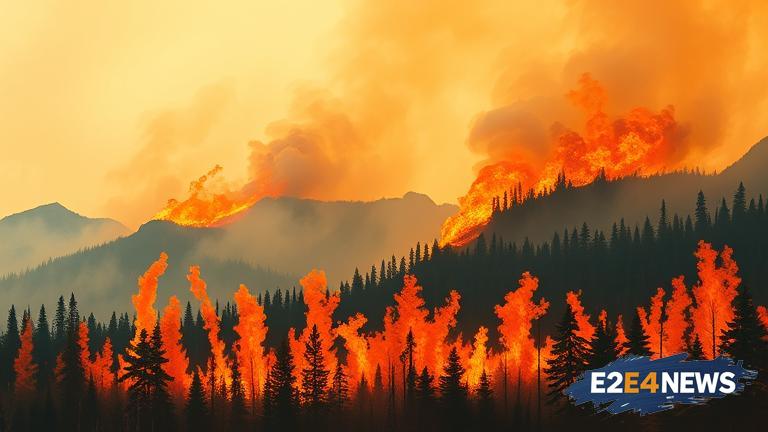The recent Canadian wildfires have resulted in a significant decline in air quality, posing a threat to the health and well-being of individuals in the affected areas. The wildfires, which have been burning for several weeks, have released large amounts of pollutants into the air, including particulate matter, carbon monoxide, and volatile organic compounds. These pollutants can cause a range of health problems, from mild symptoms such as coughing and sneezing to more severe conditions like respiratory infections and cardiovascular disease. The poor air quality has also led to an increase in hospitalizations and emergency room visits, particularly among vulnerable populations such as the elderly, young children, and those with pre-existing medical conditions. To protect themselves, individuals are advised to stay indoors, avoid strenuous outdoor activities, and wear masks when venturing outside. It is also essential to keep windows and doors closed, use air purifiers, and avoid smoking and other activities that can exacerbate poor air quality. The Canadian government has issued air quality alerts and advisories, warning individuals of the potential health risks associated with the poor air quality. The situation is being closely monitored by health officials, who are working to provide support and resources to those affected. In addition to the health impacts, the Canadian wildfires have also had a significant economic and environmental impact, with many businesses and industries affected by the poor air quality. The wildfires have also led to the displacement of thousands of people, who have been forced to evacuate their homes and seek shelter elsewhere. The Canadian government has pledged to provide support and resources to those affected, including financial assistance and access to healthcare services. As the situation continues to unfold, it is essential for individuals to stay informed and take necessary precautions to protect their health and well-being. The air quality is expected to remain poor for the next several days, and individuals are advised to stay tuned to local news and weather reports for updates. The Canadian wildfires serve as a reminder of the importance of taking care of our environment and the need for sustainable practices to prevent such disasters from occurring in the future. Furthermore, the situation highlights the need for increased funding and support for wildfire prevention and management efforts. The Canadian government has announced plans to increase funding for wildfire prevention and management, which is expected to help mitigate the impact of future wildfires. In the meantime, individuals can take steps to reduce their exposure to poor air quality, such as avoiding outdoor activities, using air purifiers, and staying indoors. It is also essential to support those affected by the wildfires, including donating to relief efforts and volunteering time and resources. The Canadian Red Cross has launched a relief effort, providing support and resources to those affected by the wildfires. As the situation continues to unfold, it is essential for individuals to stay informed and take necessary precautions to protect their health and well-being. The Canadian wildfires are a reminder of the importance of taking care of our environment and the need for sustainable practices to prevent such disasters from occurring in the future. The poor air quality has also led to an increase in air quality monitoring, with many organizations and individuals working to track and monitor the air quality in real-time. This information is being used to inform decision-making and provide support to those affected by the poor air quality. In conclusion, the Canadian wildfires have had a significant impact on air quality and health, and it is essential for individuals to take necessary precautions to protect themselves. By staying informed, taking steps to reduce exposure to poor air quality, and supporting those affected, we can work together to mitigate the impact of this disaster and prevent similar disasters from occurring in the future.





